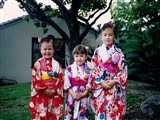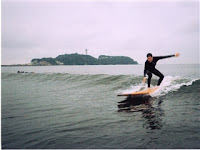
What are you? Are you Chinese? Are you Japanese? These are questions that I have been asked thousands of times. What do I answer? Well, that depends on where I am. In America, I always answer, "I'm Japanese". In the states, people usually automatically answer according to their ethnicity. But in Japan when I'm asked, "What are you?" My answer is "I'm American". I guess the most accurate answer would be Japanese-American in either case.



Do you know which country has the most people of Japanese descent outside of Japan? Well, it's not America, it's Brazil. America has just over a million people either part or full Japanese. We only make up 0.4% of the country's population. California has the highest number with almost 400,000. I was fortunate to grow up there. As a fourth generation Japanese-American (Yonsei), I was able to experience and learn many things about the Japanese culture. We can thank the issei for bringing these Japanese customs and traditions with them and the nissei/sansei for carrying them on. Buddhism was one thing the issei brought to America with them. I attended the Stockton Buddhist Temple (
http://www.stocktonbuddhisttemple.org/home/ ).

Although I went to Sunday school, I can't say I learned that much about Buddhism. It was more of a place to go to see my friends and learn some Japanese culture. For example, every summer my church would hold its Obon festival. This was more like a food and cultural bazaar. There would be delicious Japanese foods such as tempura, teriyaki chicken, grilled corn, yakitori, udon, curry rice, etc. There was also bon odori and taiko drums and other Japanese displays. As a teenager, going to the Obon festivals in my city and other cities in the Bay Area was one of the highlights of each summer. Can you guess why? :) There were also "Cherry Blossom" festivals each spring where they'd usually crown a "Miss Cherry Blossom". We didn't, however, sit under cherry blossom trees and eat and drink like here in Japan. I also tried Judo and Karate as a youngster but the sport which I enjoyed the most was basketball. I started playing in elementary school for my church team and continued playing with them all through high school. I'm still close to most of those guys. BTW, I'm still playing basketball now. In fact, just yesterday I played in my first "Over 40" tournament with a local Odawara team. This was a lot of fun but nothing will compare to the basketball tournaments we had back in high school where the main event was always the Saturday night dance!

About my family's migration to California, I think my great-grandparents went over in the 1890's. This was the first wave of immigrants and they mainly worked on fruit and produce farms. My ancestors were from Hiroshima, Kumamoto and Wakayama. My grandpa Henry is now 98 years old and had a very successful produce business going before the war. He lost this and his house and was put in an internment camp with 120,000 other Japanese-Americans by the US government. After getting out of "Camp", he was able to start and run another successful produce business in Stockton. He was once even known as "The Tomato King".
I often thought about how my life would have been had my brave great-grandparents never ventured out west. It's funny because I surely couldn't be teaching English here in Japan nor
writing this BLOG in English. I did go through a little of an "anti-Japanese" phase and had wished I were white like all my friends in my neighborhood and school but by the time I was in junior high, it became more of a curiosity. This was probably the first time I started to relate to my Japanese heritage and show an interest. While away at college, I knew that this is where I'd come after I graduated and I did. I thought I'd be here for one year teaching English, learning about my roots and become fluent in Japanese, hahaha. I've now lived in Japan a total of 11 years!
Being Japanese-American in Japan is a bit peculiar. We are kind of like a Stealth fighter jet because we can come out of nowhere and surprise an unexpecting Japanese person by just speaking. When I first came and couldn't speak any Japanese, I'd often get that "This guy must be retarded" look whenever I went into a store/restaurant. On the other hand, it's actually quite nice to be able to sit in a train or walk into a store and not be stared at like some of my compatriots say sometimes happens to them. Before coming to Japan, I did have my concerns about how my students would feel about their teacher being Japanese-American. I've learned that in most cases, it hasn't made any difference at all. I think most Japanese don't care what nationality or ethnicity I am but more about what kind of person/teacher I am.
In the end, I will leave you with a list of 10 ways to tell if you're Japanese-American:
1) You have a Japanese middle name (mine is Touru)
2) Your first inclination is to look for other JA professionals when you need professional services
3) You know the story of "Momotaro"
4) Whenever you meet another JA, you're somehow related or there's someone you know in common
5) Growing up, you heard the words: abunai, takai, hakujin, atsui, baka, benjo, bachi
6) Whenever you were sick, you ate "okayu" with "umeboshi"
7) You use the finger method to measure the water level in your rice cooker
8) You pack "bento" when you take a road-trip
9) Some of the best food served is made by players' moms after JA basketball games
10) "Botan-Ame" used to be your favorite candy


 the North Korean High School and a
the North Korean High School and a 






























